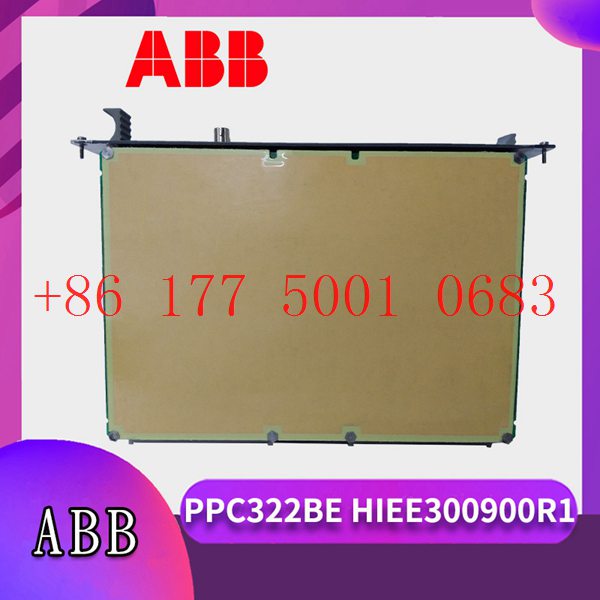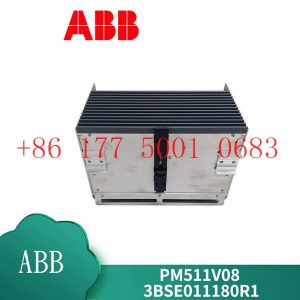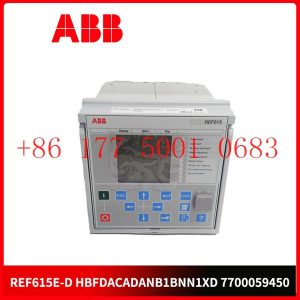Description
hardware flow control. It is an ideal choice in the field of industrial automation.
Although it was established only a few months ago, ABB Future Lab has already cooperated with Huawei to
complete the AI training of garbage sorting robots in two months. This robot uses AI technology based on Huawei
chips and uses industrial cameras to sort objects.
Obviously, adjusting the business model and organizational structure is an important reason why ABB has
lways been at the forefront of the industry.
From technology iteration to application implementation, ABB aims to provide complete solutions
As a pioneer in manufacturing automation and digitalization, ABB”s products in the automation field are constantly
improving, and its application industries are also expanding.
In Alf”s view, the structure and construction of automation have not changed much in the past 30 years. From signal
collection and information transmission to work scenarios or operational interfaces, the flow of information in automated systems has basically not changed.
But the arrival of 5G may change the way information is transmitted between devices. 5G’s characteristics such as large
capacity, high reliability and low latency make it possible to realize independent connections between devices. If real-time
mainline connection can be achieved and installed on the cloud or platform, it will be a more disruptive application.
5G will not only change the way ABB operates, but is also likely to introduce digitalization into the industry, including digital
operation and maintenance. ABB has launched an industrial Internet solution called ABB Ability, which firstly provides a platform
, and secondly, it includes all ABB”s digital cloud products, such as equipment industrial solutions and transportation solutions.
In addition to digitization, another focus of Alf is the autonomy of machines. He took the autonomous management of
autonomous driving and warehousing as examples to think about the development process of machine autonomy –
from human operation to machine operation, and ultimately to autonomous implementation and testing without the need for humans at all.
For ABB, in addition to popular autonomous driving technology, industrial production scenarios also have strong
demand for the autonomy of machinery and equipment, such as autonomous docking of ships and the mining industry
. In some industrial scenarios represented by mining, toxic gases and substances in the working environment are
harmful to the human body, so equipment
is required to have the ability to enter and leave the mine independently. ABB first needs to study the value proposition
of these businesses, discover potential applications, and then discover in which fields it can be applied.
A technology close to autonomy is artificial intelligence. Since its birth in the 1960s, it has been attracting people”s
attention, and there have been endless discussions about “robot replacement”. After decades of development,
related technologies have gradually matured, and more and more AI technologies have begun to be discussed
in the application field. The products and technologies
of leading manufacturers such as ABB have attracted much attention.
ABB has been applying AI technology to its products for 20 years, but its current mature products are mainly
diagnostic applications based on traditional statistics. Alf introduced to Yiou New Manufacturing that
as part of the diagnostic solution, this technology is mainly used to implement condition monitoring functions
. More mature applications are reflected in the automated management of equipment, such as the electronic
management of ships.
Machine learning is another promising AI technology. At the World Artificial Intelligence Conference at the
end of August this year, ABB demonstrated a coffee workbench composed of a two-arm collaborative robot Yu Mi.
Through guided programming of YuMi, the collaborative robot can learn and
remember the barista”s movements to complete the complete process of making coffee, latte art and delivering it to the audience.
In actual implementation scenarios, this technology is used to transform terminals carrying containers. By simulating the
location and status of box handling, the collected data is used to train the AI, allowing the AI to know the
location of the container, thereby achieving automation.
From automation, digitalization, autonomy and artificial intelligence technologies, ABB is not a blind pursuer of
emerging technology concepts. It pays more attention to customer needs and actual implementation, and achieves
better solutions through different product combinations.
There are two major difficulties in balancing R&D and business and implementing solutions.
As a commercial company, ABB still needs to consider the balance between R&D investment and revenue.
In Alf”s view, they do not have unlimited R&D resources, so they need to focus on finding a balance between
improving original product functions and developing new functions. In terms of technology research and development,
we also need to try to focus on projects that can bring the greatest value to the company.
Regarding the specific implementation of digital solutions, Alf believes that there are currently two main difficulties.
The first difficulty is that ABB cannot just develop a general solution, because different industry segments
have different needs, so it must design solutions that suit their different needs. ABB not only needs to master
knowledge in different fields and different applications, but also needs to consider the availability of data.
The second difficulty lies in the use of data, because AI requires a large amount of data training. On
the one hand, ABB needs to encourage customers to provide data for training models; on the other hand,
ABB also needs to ensure customers the privacy, ownership and security of their data.
“Industrial artificial intelligence needs to be combined with models and data. But the most
important thing is that we must provide value to customers through the use of AI, otherwise we will just
apply technology for the sake of applying technology.” Alf concluded.
https://www.xmamazon.com
https://www.xmamazon.com
https://www.plcdcs.com/
www.module-plc.com/
https://www.ymgk.com
3511 Pulse Input Module| Triconex | 3515
3504E Digital input module | Triconex | 3503E
3009 Main processor | Triconex | 3009
3008 Main Processor | Triconex | 3008
VE4001S5T2B4 16 Channels Input Card | DeltaV
VE4001S3T2B2 8 Channels Input Card | DeltaV
VE4001S3T2B1 8 Channels Input Card | DeltaV
VE4001S3T1B2 8 Channels Input Card | DeltaV
VE4001S3T1B1 8 Channels Input Card | DeltaV
VE4001S2T2B5 32 Channels Input Card | DeltaV
VE4001S2T2B4 Discrete Input Card | DeltaV
VE4001S2T2B3 Discrete Input Card | DeltaV
VE4001S2T2B2 Fused I/O Termination Block | DeltaV
VE4001S2T2B1 Standard I/O Termination Block | DeltaV
VE4001S2T2 Discrete Input Card | DeltaV
VE4001S2T1B3 Discrete Input Card | DeltaV
VE4001S2T1B2 Discrete Input Card | DeltaV
VE4001S2T1B1 Discrete Input module | DeltaV
VE3051C0 Power controller carrier | DeltaV
VE3008 MQ Controller | DeltaV
VE3006 MD-PLUS controller | DeltaV
VE3007 MX Controller | DeltaV
VE3005 Controller MD | DeltaV
VE3004 MD Controller | DeltaV
VE3002 Controller Module | DeltaV
SE4005S2B2 8 channels AO Card | DeltaV
SE4005S2B1 8 channels AO Card | DeltaV
SE4003S2B1 8 channels AI Card | DeltaV
SE4002S1T2B1 8 channels DO Card | DeltaV
SE4002S1T1B2 8 channels Discrete Output Card | DeltaV
SE4002S1T1B1 8 channels DO Card | DeltaV
SE4001S2T2B1 Traditional I/O | DeltaV
SE3008 SQ controller | DeltaV
SE3007 SX controller || DeltaV
SE3006 controller | DeltaV
KJ3002X1-BB1 AO, 8-Channel, 4-20 mA Card | DeltaV
KJ3002X1-BA1 8-Channel HART Card || DeltaV
KJ3001X1-BK1 Input module | DeltaV
KJ3001X1-BH1 8 channel output module || DeltaV
KJ3001X1-BG1 DO, 8-Channel, 24 VDC, Isolated Card | DeltaV
KJ3001X1-BD1 Dry contact module || DeltaV
KJ3001X1-BB1 Input module | DeltaV
KJ3001X1-BA1 DI, 8-Channel, 24 VDC, Isolated Card | DeltaV
KJ2201X1-BA1 Logic Solver – SLS 1508 || DeltaV
KJ2101X1-BA1 I/O interface card | DeltaV
KJ2004X1-BA1 Remote interface unit || DeltaV
KJ2002X1-BA1 Controller M3 module | DeltaV
KJ2001X1-BA1 controller | DeltaV
KJ1501X1-BC1 SYSTEM POWER SUPPLY | DeltaV
KJ1502X1-BB2 System power supply || DeltaV







Reviews
There are no reviews yet.